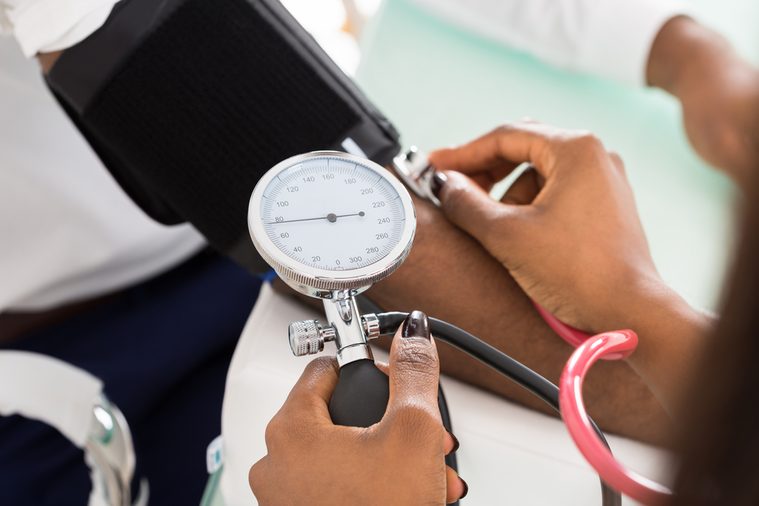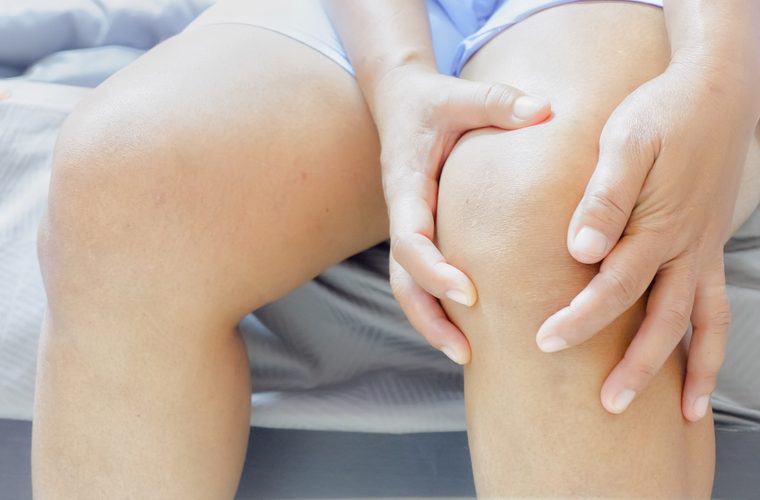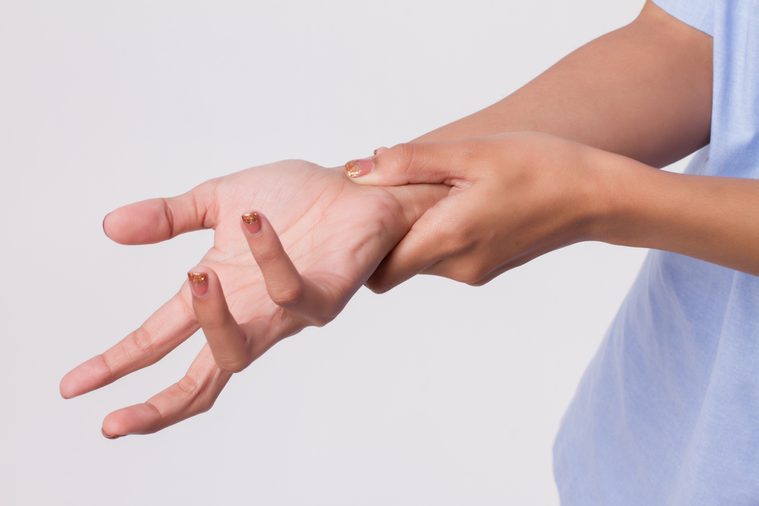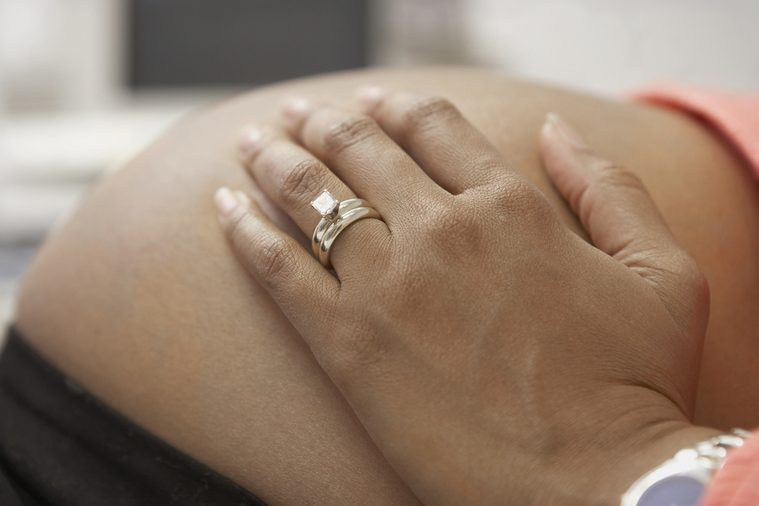
You lower diabetes risk
Losing weight can seem like an overwhelming undertaking, but even dropping just a few pounds can have a big impact on your overall health. “You get a large ‘bang for your buck’ with only a 5 percent weight loss,” says Samuel Klein, MD, professor of medicine and nutritional science, and director of the Center for Human Nutrition at Washington University School of Medicine. For a 200-pound person, that’s just 10 pounds—but losing it takes a big strain off your body. Dr. Klein’s study shows one of the many boons is reduced diabetes risk, a condition marked by high blood sugar. “The beneficial effects include decreased total body fat, intra-abdominal fat, and liver fat and increased insulin sensitivity in liver, muscle, and fat tissues,” he says. Because the body requires insulin to absorb and use blood sugar, better insulin sensitivity means better blood sugar control. Find out the motivation that helped these 22 people lose weight.

You lower blood pressure
According to the American Heart Association, losing as little as five to ten pounds in overweight people may help lower blood pressure. Research clearly supports this link. With extra weight, your body has to work harder to pump blood, which can damage blood vessels and harden the arteries. “Being obese also increases the body’s demand for oxygen and increases blood volume,” says Ali Webster, PhD, RD, associate director of nutrition communications for the International Food Information Council Foundation. Try these 42 fast, easy tips to lose weight.

Your heart health improves
Beyond lowering blood pressure, losing some pounds improves your overall heart health, according to research. “The results from our study demonstrate that even a moderate 5 percent weight loss in people with obesity has considerable health benefits by simultaneously improving metabolic function in multiple organ systems and decreasing other risk factors for cardiovascular disease, including plasma triglyceride concentration,” Dr. Klein says. Obesity is also associated with high “bad” LDL cholesterol and low”good” HDL cholesterol, Dr. Webster says. “Each of these are risk factors for cardiovascular disease, a group of conditions that includes coronary artery disease, heart attacks, and strokes,” she says. Here are 50 more things doctors wish you knew about losing weight.

You lower your cancer risk
Your weight impacts your hormones, immune system, and factors that regulate cell growth—all of which are tied to cancer risk. That’s why being overweight or obese may increase your chances of getting the disease. “The relationship between cancer and weight is complex, and several different mechanisms are involved,” Dr. Webster says. “According to research from the American Cancer Society, excess body weight is thought to be responsible for about 8 percent of all cancers in the United States, as well as about 7 percent of all cancer deaths.” Just avoid these 17 weight-loss “tricks” that don’t actually work.

You relieve pressure on your joints
Experts agree that being overweight or obese increases your risk for osteoarthritis, or wear and tear on your joints. “The more weight that’s on a joint, the more likely it is to wear down and be damaged,” Dr. Webster says. “For example, for every pound of excess weight, four additional pounds of pressure is exerted on our knees—so if someone is carrying around 20 pounds of excess weight, that’s an additional 80 pounds of stress on the knees.” Losing extra weight reduces the amount of pressure on your joints and lowers the risk of arthritis development. You can do it—check out the most inspirational weight-loss transformations of last year.

You can lower inflammation
When it’s doing its job properly, inflammation in the body helps fight off infection. But in people who are overweight or obese, inflammation can get out of control, which increases insulin resistance as well as your risk for heart disease, cancer, arthritis, and even Alzheimer’s disease. “Excess body fat, especially when it’s located around the abdomen, is strongly linked to inflammation,” Dr. Webster says. Adipose fat tissue releases inflammation-causing molecules, but the markers of inflammation go down with even a 5 or 10 percent reduction in body weight, she says. Eat more of these 15 superfoods that can help you lose weight.

You reduce your sleep apnea risk
Sleep apnea, in which you actually stop breathing during sleep, is linked with being overweight or obese. “Sleep apnea is caused, in part, when extra tissue accumulates around the upper airway, which can change its shape and make the throat more likely to collapse during sleep,” says sleep expert Richard Shane, PhD, creator of the Sleep Easy Method. In one study, 88 percent of people who lost 33 or more pounds were effectively cured. According to Harvard Medical School, losing just 10 percent of your body weight can drastically reduce sleep apnea symptoms—and in some cases, weight loss can even cure the condition. Don’t miss these other signs your weight gain means your health is in trouble.

You sleep better in general
In a vicious cycle, lack of sleep could be making you fatter. On the other hand, you’ll get better shut-eye with weight loss. “In a study conducted at Johns Hopkins University School of Medicine, participants who had lost an average of 15 pounds show improvement in sleep quality,” Dr. Shane says. “In fact, a reduction in belly fat was the best predictor of improved sleep.” In addition, you’ll stop snoring as much—and snoring isn’t just an annoyance to your partner, but a mark of unhealthy sleep. “Snoring is in part caused by the amount of tissue around the neck,” Dr. Shane says. “When you lose weight, that reduces the amount of tissue in your neck, which can diminish snoring.”

You get a mood boost
Because the physical is also tied to the psychological, your mental health will also enjoy lighter feelings once you lose weight. “Research shows that people who lost just 5 percent of body weight experienced an improvement in mood,” says nutritionist Cynthia Sass, MPH, RD, author of Slim Down Now: Shed Pounds and Inches With Real Food, Real Fast. “And the positive changes in sleep caused by losing 5 percent are also tied to mood.” Think about it: You’re grumpy when you don’t get enough sleep, right? Plus, if your weight-loss is tied to exercise, the endorphins can give you feel-good feelings. There’s also a connection between weight gain and depression. Although it’s not clear which causes the other, some research suggests that weight loss can help alleviate depressive symptoms. Learn more about why working out for just one hour a week reduces your depression risk.

You have more energy
Even if you start slow, each bit of weight you lose will give you more energy to keep going. “Just a 5 percent drop in weight can help lower blood sugar levels and blood pressure and improve sleep quality, all of which increase energy,” Sass says. Because your body isn’t working as hard, you’ll have more resources to perform more healthy activities. And in a positive cycle, that first bit of extra energy will make changes you’re making stop seeming like such a chore. “When you have more energy, you’re more likely to feel motivated to be active and make healthier choices,” Sass says. Exercise itself has also been shown to boost energy levels. Check out these other incredible ways your body changes after just one workout.

Your fertility improves
Losing a little bit of weight can help you conceive if you’re looking to have a baby. “Women with BMIs [body mass index, or ratio of height to weight] greater than 27 are at increased risk of abnormal periods and infertility,” says Jane van Dis, MD, chair of the Bakersfield Memorial obstetrics and gynecology department and medical director of business development for Ob Hospitalist Group. “Studies show women with elevated BMIs are at increased risk for insulin resistance, which can then lead to increased testosterone circulating in the body.” This can cause polycystic ovarian syndrome (PCOS), in which ovulation doesn’t occur regularly. But losing just 10 to 15 pounds can help bring your periods back to normal. Here’s how to lose weight if you have PCOS.

You’ll get a self-esteem boost
How many times have you looked in the mirror and thought you’d be happier with what you saw if you were a little trimmer? Although body positivity is important no matter what your weight, achieving a health goal can up your confidence. “A better mood [that comes with weight loss] often leads to a boost in self-esteem and feelings of empowerment,” Sass says. “Positivity breeds positivity.” Mayo Clinic suggests setting weight-loss goals that are achievable—such as dropping 5 percent of your current weight—to set yourself up for success. Learn more surprising ways weight loss changes your personality.

Your sex drive will ramp up
More self-confidence and more energy can lead to an increased libido. Just a 5 percent weight loss can boost sex drive, Sass says. New research confirms it. “A very recent publication demonstrated that women undergoing weight loss surgery experienced significant improvement in desire, arousal, and sexual satisfaction,” Dr. van Dis says. “A woman’s own perception of her body also affects her sexual interest and satisfaction. Lastly, exercise can play a crucial role in one’s libido because it aids in weight loss and decreases depression and anxiety.” Find out 13 more secrets experts won’t tell you about weight loss.

You want to follow healthier habits
Once you start to feel the effects of all these positive benefits, the result will be a healthier lifestyle you can stick to for the long term. “Many people tell me that when they feel happier, they want to sustain that feeling, so it just makes sense to choose habits that support it, like reaching for water instead of soda, taking the stairs rather than the elevator, and snacking on fruit and almonds in place of cookies,” Sass says. “External thoughts, like ‘I should do that,’ become internally driven choices that just feel right.” Focusing on the positive changes to your health rather than the number on the scale, Sass says, will likely make you feel more excited about other healthy behaviors, like drinking more water and eating more veggies. Make these 50 easy ways to lose weight naturally part of your routine.

You might even live longer
It makes sense that decreasing your risk of life-threatening conditions would lead to a longer life. “A 5 percent loss can lower your risk of diabetes, heart disease, and cancer, so yes, it may indeed extend your life,” Sass says. Dr. Webster agrees that losing even a small amount of weight can improve overall health, though official reports haven’t confirm this. “Although 5 percent weight loss improves health and decreases the risk factors for serious diseases, we do not know if this will translate into an increase in lifespan, because that study has never been done,” Dr. Klein says. The reverse, though, has been shown: Those with a high BMI have a greater overall mortality risk. In any case, if you’re looking to feel better both inside and out, it doesn’t take a major weight transformation—just a few pounds will do. Find out how much your life expectancy goes down for every two pounds you gain.
